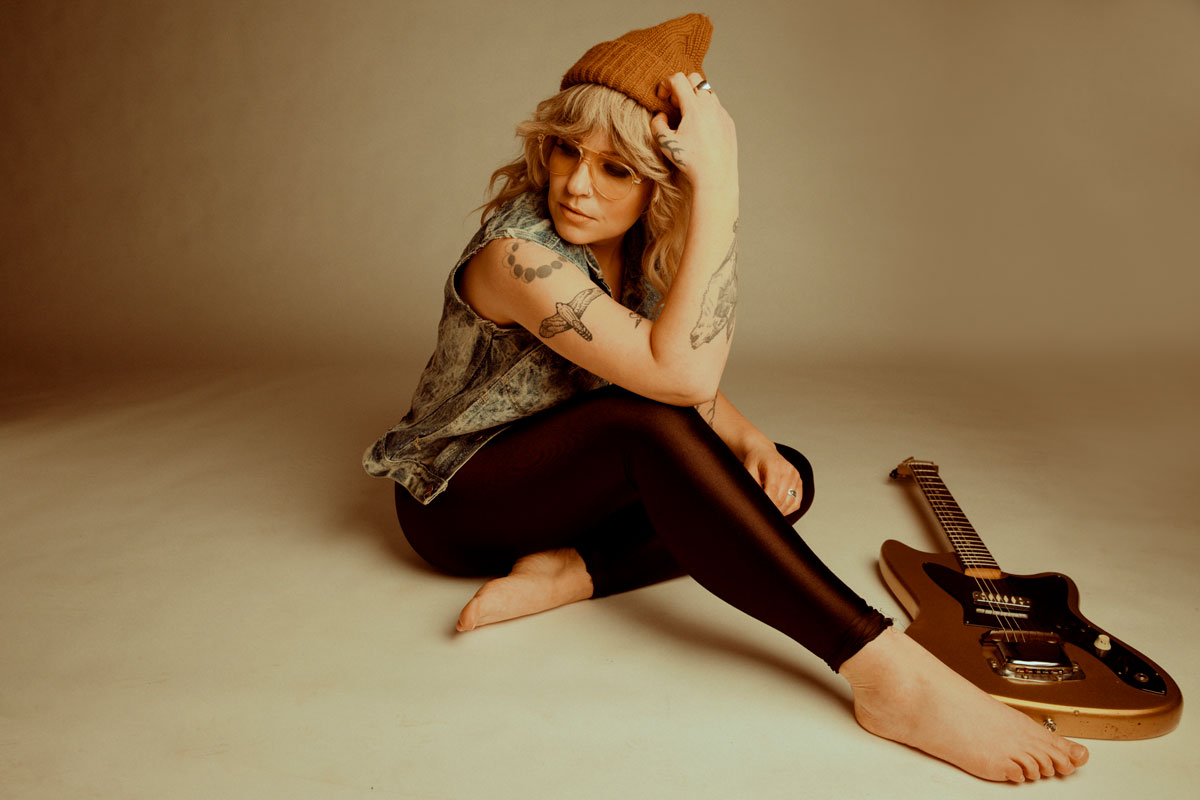Brandy Zdan: “To me, this ended up being a guitar record, because of the range of emotions in the instrument. It's a vehicle for my grief and anger”
The Canadian singer-songwriter channels her experience dealing with miscarriage, grief and postpartum depression on her new full-length, Falcon

This article is part of Guitar World's series of interviews and features with artists addressing and raising awareness around themes of mental health, particularly as they relate to musicians.
As a member of The Trishas, a producer, and certainly as a solo artist, Brandy Zdan developed a reputation as a “badass rocker chick,” a label she wore with pride on her first two albums: 2015’s self-titled debut and 2018’s Secretear.
Her new album, Falcon, lives up to all that Zdan is known for as a songwriter and guitarist, while showcasing a different side of her craft. It’s a confessional, cathartic work resulting from the miscarriage of her first pregnancy, subsequent grief and depression, and postpartum depression (PPD) following her second pregnancy and the birth of her daughter, Lucky Rose.
Falcon was recorded at The Laundry Room, which is exactly that: a small, carpeted space in her Nashville home with just enough extra square footage beyond the washer and dryer to set up a desk, shelf, amps, and a closet full of guitars.
These include her workhorse Gamble Guitar Works Custom Telecaster, 2019 Gibson High Performance SG, 1962 Harmony Rocket, 1960s Gold Airline Bobkat slide guitar, 1957 Silvertone lapsteel, Harmony Stratotone H46 Sunburst, and new Gibson Les Paul Gold Top, a recent gift from the company that she predicts will become “a mainstay”.
She tracked mostly through a Fender Princeton Reverb and also used a Fender Dual Showman with 212 cabinet. “I wanted guitar sounds that would wrap you up like big, warm guitar blanket,” she says.
Zdan played guitar and keyboards, and produced and engineered the album. She was joined by her husband, Aaron Haynes, on drums, Will Honaker on bass, and Josh Grange on pedal steel on one track, Mama. Grange and Honaker did some additional engineering work at Grange’s Resistor Studios, where he also mixed.
Get The Pick Newsletter
All the latest guitar news, interviews, lessons, reviews, deals and more, direct to your inbox!
Zdan’s Tele and SG feature prominently on the album. “The sound of that Tele has become part of my identity, and I have a hard time getting away from it,” she says. “It has 11’s on it and they’re always dead, and I just love that.
“It’s not the bright Tele sound you would expect. When I wanted something a little more punchy and twangy, I used the SG on the bridge pickup. I also used the Silvertone and a baritone guitar that was loaned to me by a local recording engineer named Mike Poole.”
With Falcon out now, how do you feel about your vulnerability being exposed to the world?
“There are days when I feel like this will not be seen, and days when I feel I am truly seen in the vulnerability and messages that are put forth, as well as stepping into these new roles as an artist.
The daily work I do includes meditation, exercise, reading, audiobooks. I gravitate toward the messages I need to hear when I start to spiral, so that the spiral doesn’t go all the way
“I'm uncomfortable a lot of the time, to be honest, and I'm learning that that is part of stretching myself. I wasn't uncomfortable when I wrote the songs. Being uncomfortable comes with the territory, the vulnerability. So I just stay brave with it and know that I have no control over people’s reactions.
“I am also trying to come at it with a simple sense of gratitude that I was able to make the record, write the songs, have the tools to do so, be open enough to do so, and even be open enough to record it on my own, because that's a whole other level of vulnerability.
“So I'm trying to act from that place of gratitude, because I could easily go the other way quickly if I don't keep myself in check. I guess these are things I need to learn right now, so I'm trying to learn the lessons.”
How do you keep yourself in check?
“There’s so much reaction and emotion tied to this, and tied to the mental capacity you need to keep yourself in check with the music industry itself, let alone everything else.
“The daily work I do includes meditation, exercise, reading, audiobooks. I gravitate toward the messages I need to hear when I start to spiral, so that the spiral doesn’t go all the way. I got a lot of therapy when I was dealing with postpartum depression, and it gave me tools to figure out what I was doing in order to avoid the feelings, like drinking, smoking, eating, or telling myself things that weren’t real or true. I’m now able to see it when it’s starting to happen, and I’m gentler on myself.

“There are still little things about postpartum depression that veer up, these detailed, played-out, worst case scenarios. That stuff is very scary. It happens maybe once every couple of months now, but it was almost every day, things you go through that nobody tells you about, and nobody tells you how to deal with them.
“And of course I was in ‘pandemic mode’ and the scariness of that too, combined with bringing a new baby home. I have a hard time looking back on it. It was like being blown wide open, just crying all the time and wondering what was happening with the world.”
You’ve spoken about vulnerability in your songwriting. Does the guitar play as much a part in that as the lyrics?
“Absolutely, because that instrument is an extension of my being, and I can use the guitar to convey emotions when I can’t use or find the words. Dying Inside, the opening song on the album, those guitar sounds are all my emotions and feelings. The straightforward guitar riff in The Worst Thing is a vehicle for my grief and anger.
The guitar excites me so much because it doesn't have to be used in only one way. It doesn’t have to just be riff rock, blues rock, the go-to sort of way that we all know
“I feel extremely powerful when I'm playing those kinds of riffs and creating those soundscapes. With the steel guitar swells on I Am Wild, I was trying to make the sounds equivalent to what the lyrics were portraying, and I felt it when I played those parts.
“The guitar excites me so much because it doesn't have to be used in only one way. It doesn’t have to just be riff rock, blues rock, the go-to sort of way that we all know. It's so many things, just like music is so many things.
“That's why this ended up being, to me, a guitar record – because of the range of emotions in the guitar, even though it's not necessarily evident or in your face all the time. I appreciate the art of subtlety in guitar playing. It doesn't always have to be a thousand notes; it just has to be the right one to portray the feeling.”
Falcon was two years in the making, during which you lost your passion for music, experienced a miscarriage, grief, depression, postpartum depression, and pandemic lockdowns. How did you find yourself again after so many challenges?
“The loss of career passion came from the fact that there are unrealistic expectations put upon us as artists. We live in a time where we can only make money touring. I came to Texas from Canada and was living in the United States on an O-1 visa, which meant I only make my living from music – another expectation that is really tough when you make your living playing your own songs.
“I also was a hired guitar player. I was on the road all the time for so long that it became my identity. I was writing songs and making records, but every conversation I had was about the next tour.
“In the summer of 2019, I was on a wonderful tour, opening for a band and grateful to do it, but I had just had the miscarriage in May. I was nine weeks in, and I knew nothing about what was happening because I didn't know about this stuff. Also, nobody knew about my pregnancy because you're not supposed to tell anybody, which is something I don't agree with.
“I had gone for an ultrasound and there was no heartbeat, and it is completely devastating in a way that you don't even know you're capable of being. I made the decision to take misoprostol, the pill that is prescribed to end an early pregnancy.
“I was going on tour the next week; that was my livelihood, I needed the dates, I needed to make money. So I took the pill, and that experience unto itself – feeling the contractions, and then the remains coming out – I don't have words to describe it. Your heart is breaking, and you want to just lie in bed for days. But I wasn't able to do that because I was going on tour.
When postpartum hit me, it was like whiplash. I had never felt this way. It was so extreme
“Aaron wasn't touring at the time, and he said, ‘I’m coming with you and I’m going to drive, because you don’t need to be by yourself.’ He was right, because that grief, especially in that first month… my God, it's everywhere. It's just under the surface, if it's not at the surface.
“I was devastated for a long time, and I still kind of don’t ‘go there,’ but it's always there. It's the questions, the what ifs. The innocent joys of that first pregnancy test you ever have – you never get that again. That only happens one time.
“I was on tour again, as a duo with Aaron, when I got pregnant again. There's so much joy, of course, but there's so much dread, and that continues and informs your pregnancy because you're so scared because you keep thinking about what happened the first time. It just was so heartbreaking.
“It's so much, and it breaks my heart still to think about all the women having to go through it and not knowing what is going on or how to deal with it. It’s not something we talk about, and that really pains me.”
Grief and depression are difficult enough individually and even worse together, sometimes causing us to lose all ability to function. What enabled you to persevere?
“It has to do with my daughter and how much of a light she is, and just focusing on that, and of course going to therapy. When postpartum hit me, it was like whiplash. I had never felt this way. It was so extreme. I had never in my life had thoughts of death. That's different from thoughts of suicide. It's thoughts of leaving a situation, like, ‘What would it be like if I wasn't here?’ and the relief that would come from that.

“When you realize it, even when I say it now, it scares me that I was having those thoughts. It’s not the same as ‘I want to kill myself.’ It's ‘Can I just go, so I can have relief?’ But you don't really want to go.
“And then those worst case scenario thoughts all the time, like, you're going to get up from your bed, trip and fall, and your daughter is going to fall out of your hands and hit the wall. You play out every detail. Your brain goes to these places, these totally irrational, completely wild thoughts. That's the spiral. I’ve never felt so helpless.
“I would look out the window and be completely lost. I couldn't control the thoughts, couldn’t control all those feelings, and that’s when I reached out to a therapist. We were in a pandemic, so we had to do phone therapy, but as soon as I could go in person, I went every week. I was able to make my way through it with her help.
“It's hard to be a mother to start with, but postpartum is some of the hardest stuff to go through. You’re trying to keep this little being alive and keep yourself alive in a country that tragically under-supports mothers. So you're worried about the medical bills you've racked up, or you’re on unpaid leave and how are you going to make the bills. All of these things make me tear up when I think about what mothers have to go through who have less support than I.
If we were to start talking about this stuff, the takeaway would be that most of the population would understand what half the population is going through, which might mean that we support women and mothers better
“And the fact that this is forced upon some women without them having that choice or the resources to make that choice – it is not something anybody needs to be doing if they do not want to do it. You need to want to do it, because even when you want to, it's still the hardest thing you've ever going to do.”
It’s 2021, and in addition to misunderstanding and stigmatizing mental health, society remains secretive and clueless about miscarriage and postpartum. Why are we so hush-hush about things that are so important for us to discuss?
“I think it's scary for men because it's so hard to understand. And it's not the same experience for them. Even if they're a part of it, they're not going to experience the same grief. I also think this goes back so, so far into the gender suppression of women in general.
“And there’s a weird energy around anything that has to do with a woman's reproductive system. This is all so messy and undefined. There's no black-and-white with miscarriage, with loss, with postpartum depression. It also maybe takes away some of the 'wholesome' identity that people want to keep about motherhood.
“If we were to start talking about this stuff, the takeaway would be that most of the population would understand what half the population is going through, which might mean that we support women and mothers better.
“People still have problems talking about grief in general. We all need to learn how to communicate better. It makes me so sad. We have all this power and all of these stories that we haven't been able to tell, and we’ve got to tell them. It’s the only way that people will know that there are different experiences out there and start to understand them.”
- Brandy Zdan's new album Falcon is out now via Lucky Rose Records.
Resources
Alison Richter is a seasoned journalist who interviews musicians, producers, engineers, and other industry professionals, and covers mental health issues for GuitarWorld.com. Writing credits include a wide range of publications, including GuitarWorld.com, MusicRadar.com, Bass Player, TNAG Connoisseur, Reverb, Music Industry News, Acoustic, Drummer, Guitar.com, Gearphoria, She Shreds, Guitar Girl, and Collectible Guitar.
“He got that from me. I used to throw my guitar as high as I could, like, 20 feet, and my guitar tech would catch it”: Dez Dickerson on Prince, his iconic Little Red Corvette solo, and why he left the Revolution
“I’d always seen the guitar as a thing for really accomplished people like Jimi Hendrix – watching Nirvana on MTV Unplugged exploded my brain”: Studio nerd Corinne Bailey Rae broke through after moving on from her punk roots. Then she went back









